|
|
|
Sort Order |
|
|
|
Items / Page
|
|
|
|
|
|
|
| Srl | Item |
| 1 |
ID:
129676
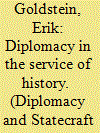

|
|
|
|
|
| Publication |
2014.
|
| Summary/Abstract |
In 1898 Governor William Bradford's early history of the Plymouth Colony was returned to Massachusetts through diplomatic, and sub-diplomatic, efforts. This marked an important stage in the growing Anglo-American rapprochement. It also illustrates an early episode of Cultural Diplomacy, as well as of repatriation of a cultural object.
|
|
|
|
|
|
|
|
|
|
|
|
|
|
|
|
| 2 |
ID:
129677
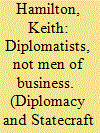

|
|
|
|
|
| Publication |
2014.
|
| Summary/Abstract |
In the aftermath of the Great War, British diplomats were criticised for their earlier failure to pay due attention to international economic developments. However, as this essay reveals, in an effort to contain Germany's peaceful penetration of Ottoman Turkey after May 1906, Britain's foreign secretary, Sir Edward Grey, was ready to commit his department's Secret Service money to the joint Anglo-French purchase of the Constantinople Quays Company. The venture proved less than profitable, and it was not, as some diplomats hoped, the precursor of a successful "industrial entente" between Britain and France in the Near East. Indeed, if anything, it highlighted the difficulties faced by diplomats in seeking to reconcile the interests of business and state in the conduct of foreign policy.
|
|
|
|
|
|
|
|
|
|
|
|
|
|
|
|
| 3 |
ID:
129678
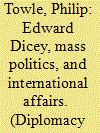

|
|
|
|
|
| Publication |
2014.
|
| Summary/Abstract |
The journalist, Edward Dicey, made an original contribution to the mid-nineteenth century debate on the growing involvement of the mass of people in political affairs. He argued that political education initially encouraged nationalism, causing the series of wars on which he reported. Beginning as an enthusiast for Camillo Cavour, the Piedmontese statesman, and the unification of Italy, Dicey became increasingly aware of the destructive impact of Irish nationalism on Britain and the threat to the British Empire from the growth of nationalist feelings amongst colonial peoples. However, he forecast that in the end, the forces of what at present is known as globalisation would bring nations closer together. Dicey is not well remembered today, but his work is important for showing the way in which a well-travelled Briton reacted to the breakdown in European security in the mid-nineteenth century and the growth of extra-European nationalism.
|
|
|
|
|
|
|
|
|
|
|
|
|
|
|
|
| 4 |
ID:
129682
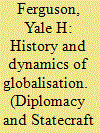

|
|
|
|
|
| Publication |
2014.
|
| Summary/Abstract |
Globalisation involves geographically wider transaction networks and has multiple interrelated dimensions. The globalisation process has geographical scope, volume and density of transactions, and a direction and pace of change. Globalization has a long history, and the local and the global have almost continuously interacted. Most forward changes have been incremental, and there have also been major reversals or almost complete system-breakdowns. There are numerous drivers of globalization of different types, persons, and groups with varying motives, and anonymous drivers like technology, weather, and disease. The article devotes most attention to a review of selected patterns and trends in contemporary globalisation These are climate change; demographic trends, income inequality, and migration; security concerns, technology, and peacekeeping; competing ideologies; the global economy, equities, trade, banking reform, and tax havens; and shifting power relationships among the United States, Europe, China, Japan, and Emerging Markets.
|
|
|
|
|
|
|
|
|
|
|
|
|
|
|
|
| 5 |
ID:
129680


|
|
|
|
|
| Publication |
2014.
|
| Summary/Abstract |
International sporting competition has played a rôle in diplomacy since at least the ancient Olympiad. Competitors in international sporting events have always possessed the capacity to represent their governments and peoples-and, more latterly, sponsoring firms-not only to foreign governments but also to foreign populations and the global public more broadly. The rapid increase in the number and variety of international sporting competitions over the past 50 years has seen "the increase in people-to-people exchanges, both virtual and personal, across national borders." The communicative power of international sport has increased dramatically by the information and communications technologies revolution over the past several decades, enabling the audience for major sporting events to expand to hundreds of million people. Yet, little study on how international sport relates to public diplomacy has occurred and remains not well understood. This analysis fills in this lacuna.
|
|
|
|
|
|
|
|
|
|
|
|
|
|
|
|
| 6 |
ID:
129674
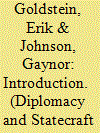

|
|
|
|
|
| Publication |
2014.
|
| Summary/Abstract |
This special issue of Diplomacy & Statecraft is in recognition of the contribution of Richard Langhorne to the fields of international history, diplomacy, and statecraft. He was a member of the founding Editorial Advisory Board of Diplomacy & Statecraft in 1988 and has served on that board for a quarter of a century, providing important guidance and notable contributions over many years. In his service to the scholarly world, beside his involvement with Diplomacy & Statecraft, Richard was one of the initial committee members of the British International History Group, of which he was the founding chairman and whose successful launch and in its early years he did much to ensure.
|
|
|
|
|
|
|
|
|
|
|
|
|
|
|
|
| 7 |
ID:
129681


|
|
|
|
|
| Publication |
2014.
|
| Summary/Abstract |
This analysis takes its cue from Richard Langhorne's contribution on the continuities of diplomacy and the nature of the European Union [EU] as a diplomatic actor. It traces the institutional changes following the 2009 Lisbon Treaty, looking at the rationale for and the foreign policy roles of the president of the European Council, the High Representative, and, particularly, the European External Action Service [EEAS]. The creation of the EEAS has been especially contested, largely as a product of continuing competition amongst European institutions and the member states. The outcome, however, has been a more visible European diplomatic service that increasingly provides authoritative information to member states, many of whom have limited representation of their own. Whilst that potentially strengthens the role of the High Representative in policy-making, it still leaves many member states determined to see EU diplomacy in support of rather than as a substitute for their own.
|
|
|
|
|
|
|
|
|
|
|
|
|
|
|
|
| 8 |
ID:
129675
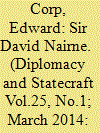

|
|
|
|
|
| Publication |
2014.
|
| Summary/Abstract |
Clerks employed in the Foreign Office before 1906, and in the offices of the secretaries of state before 1782, were scribes rather than advisers; often little is known about either their opinions or influence. An interesting exception is Sir David Nairne, who worked for many years for the secretaries of state in exile employed by King James II and his son, King James III. Nairne's career falls into three unequal parts: 1689-1713, when little more than a clerk carrying out the instructions of his superiors; 1713-1719, when promoted as one of James III's principal advisers; and 1719-1728, when demoted once again to a clerk, albeit with enhanced status. Yet even when one of James III's two most influential advisers, he remained primarily an assistant rather than a councillor putting forward his advice with caution. For both James II and James III, Nairne was not a civil servant in the modern sense but, rather, a domestic or household servant employed and used as circumstances demanded. For a short time, Nairne had a significant diplomatic career, but he always remained primarily a servant.
|
|
|
|
|
|
|
|
|
|
|
|
|
|
|
|
| 9 |
ID:
129679
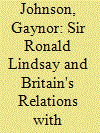

|
|
|
|
|
| Publication |
2014.
|
| Summary/Abstract |
Of the five diplomats who held the post of British ambassador to Berlin during the interwar period, the two-year embassy of Sir Ronald Lindsay, 1926-1928, has received least attention by historians. This article charts three main aspects of Lindsay's career in Berlin. The first of these is his relationship with the Foreign Office, which is consistently good although Treasury comments on his reports about Germany's continuing financial problems expose some of the friction within the British government about how best to deal with the German reparation problem. The second area explored by the article examines Lindsay's views on the "German question," and suggests that the post-Locarno period did not witness a significant growth of trust between Britain, France and Germany on questions concerning international security. Finally, the article examines how Lindsay's thinking about German affairs compares to his predecessor and his successors and explores Lindsay's views about the likely trajectories of German foreign policy.
|
|
|
|
|
|
|
|
|
|
|
|
|
|
|
|
|
|
|
|
|